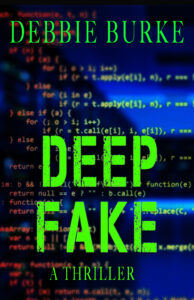
by Debbie Burke
@burke_writer
Meet Sophie and Fred, both 59. Fred has a good job with the county and hopes to retire in a few years. Sophie’s job as an administrator pays well but she recently had to cut back to part-time to care for her mother who has cancer.
Their mortgage is paid off but this year property taxes on their home jumped by a third. They no longer have weekly date nights because restaurant prices have increased. They’re helping their adult son Bobby with rent and car payments because he’s paying back student loans. Plus, he recently told them he and his girlfriend are having a baby. Even though that means more expenses, Sophie and Fred are ecstatic and post the ultrasound image of their granddaughter on Facebook. They also regularly post photos of their entertaining dog.
Then Sophie’s mom gets worse. Sophie quits her job to be a full-time caregiver. Inflation strains their budget. Their income is reduced. Bills increase. Fred must continue to work and retirement is pushed far into the future. Just to survive, they may have to sell their home.
They are not wild speculators or greedy Wall Street wolves. They are regular folks feeling desperate about money.
Enter Amelia.
Amelia is a high school classmate whom they hadn’t heard from in years. She reaches out to them on social media.
[Alarm bell #1]
Just for fun, let’s have a quiz. Where alarm bells are noted in red, what are reasons for them to ring? Answers at the end of the post.
Sorry to miss our 40th reunion but I was on a cruise in Bermuda. How are you guys doin’? Excited about your new granddaughter! Do you still have that adorable little cockapoo Sniffy?
They message back and forth, catching up.
Then Amelia admits she’s had money problems–her employer went bankrupt, taking down her 401K and pension accounts. She lost her home to foreclosure and her car was repossessed.
“How can she afford a Bermuda cruise?” Sophie asks Fred.
“Hope she doesn’t hit us up for a loan,” he answers.
But that doesn’t happen. In fact, Amelia’s next communication is just the opposite.
The good news is, Amelia made an amazing recovery by investing in a new cryptocurrency, BlueSkycoin (fictitious name). In just over a year, thanks to her investment “coach”, her initial investment of $20,000 is now worth $432,497.
[Alarm bell #2]
She sends screenshots showing the meteoric rise in value. Her statements also show large withdrawals she’d made to buy a new home and a Tesla.
Sounds kinda risky, Fred messages back. Are you sure it’s legal?
Absolutely! Totally legal with a guaranteed return. You can take your profits out anytime.
[Alarm bell #3]
Amelia was always at the top of their class and earned an MBA from Wharton. Fred and Sophie figure she must know what she’s talking about. Now they’re curious.
Amelia directs them to a glamorous, professional website with testimonials from renowned financial gurus and celebrities. Even Elon touts this cryptocurrency platform.
[Alarm bell #4]
Amelia explains “Investment Coach” Victoria is very picky about whom she accepts as clients and needs to check people out before she agrees to let them into the exclusive limited pool of investors.
[Alarm bell #5]
When Sophie and Fred email Victoria for more information, she asks them to demonstrate they’re serious by opening an online account with a good faith deposit of $5000, along with a processing fee of $500, all refundable of course once they’re approved.
[Alarm bell #6]
She conveniently provides a link to set up the account and their digital wallet.
[Alarm bell #7]
And there’s one more detail for security purposes. She needs to positively verify their identities.
On the link, Fred and Sophie are asked to send photos of their Social Security cards, passports, driver’s licenses, and bank account numbers to prove their creditworthiness. For added safeguards to protect their investments, they need to make videos of themselves for biometric verification and facial recognition to prevent unauthorized access to their digital wallet.
[By now, the alarm bells are deafening]
Fred and Sophie comply with the requests.
A few days later, Victoria sends screenshots showing their $5000 has already grown to $19,286.
Weeks later, their BlueSkycoin portfolio is worth $77,894.
More good news. A special limited new issue of BlueSkycoin is being offered to a select group of Victoria’s clients. For only a $15,000 deposit, Sophie and Fred will receive $45,000 worth of BlueSkycoin. Further growth is not only projected but guaranteed.
They deposit $15K more from savings and watch their earnings grow day by day.
[Each additional request for money is another alarm bell. Notice Sophie and Fred keep putting money in but have not actually taken out any of their supposed earnings. Their profit shows only onscreen]
They promise to help Bobby and his girlfriend move to a larger apartment and they buy baby furniture. Sophie hires a helper for her mother.
Now they are committed. Even if they suspect something is amiss, they don’t feel they can back out.
When the value of their BlueSkycoin reaches $175K, Fred suggests they celebrate by taking their long-postponed dream vacation to Tahiti.
They request funds from their digital wallet. Victoria says no problem. However, before withdrawal, there are taxes and handling fees that must be paid. That requires an additional $20K deposit to their account.
[More requests for money equal more alarm bells]
Of course, Victoria promises, they’ll quickly make that up because BlueSkycoin is set to run up even higher in value.
Sophie deposits money to cover the taxes.
Then the blue sky falls.
Overnight, Sophie and Fred are blocked from accessing their Blueskycoin account. The digital wallet they believed contained $175K is nonexistent. The trading platform vanishes, along with Victoria’s glamorous website.
Forwarding address: EffU.com
Fred and Sophie are victims of a “rug pull” which is exactly what it sounds like.
The glowing testimonial on Victoria’s website was delivered by a deepfake Elon.
Further, the rest of their savings were drained from their real bank account by “Fred” and “Sophie” imposters masquerading with stolen identification and login credentials to make withdrawals. A bank employee even talked to “Sophie” on Zoom.
Sophie could be a victim of revolutionary new malware called GoldPickAxe.
Phil Muncaster of Infosecurity Magazine describes GoldPickaxe as:
“…a sophisticated new Trojan designed to steal facial biometric data and use it to produce deepfakes of victims which can bypass banking logins.
“[The malicious app] prompts the victim to record a video as a ‘confirmation method’ in the fake app. This is then used to create a deepfake video, which can be deployed in addition to the other collected data to enable a cybercriminal to bypass banking logins.”
Who are Amelia and Victoria?

Credit: Wikimedia
Chatbots.
The real Amelia has no idea of the mischief being done in her name because her social media account was cloned. A bot is using her account to impersonate her. Personal details, like the new granddaughter and Sniffy the cockapoo, were scraped from the internet.
Chatbots are ideal employees. They don’t call in sick; they don’t complain about working graveyard shift; they don’t demand raises.
In fact, they don’t even have to be paid.

Photo credit: CCA by SA 4.0 International, https://www.bybit.com/en-US/
Fred and Sophie are not real people, but rather composites of actual victims of cryptocurrency scams perpetrated by fraudsters assisted by AI chatbots.
They are victims of pig-butchering, defined by trendmicro.com as the way “scammers fatten up their victims with the promise of lucrative returns before ‘slaughtering’ them for their money.”
The State of California’s Department of Financial Protection and Innovation runs a scam tracking website that contains an ever-growing list of complaints about cryptocurrency scams.
In broad generalities, cryptocurrency is virtual money.
According to Investopedia:
“Virtual currencies are digital representations of value whose transactions are conducted only through electronic networks or the internet. They do not have a physical incarnation.”
In other words, you can’t put bitcoin in a vending machine and buy a soda, nor can you flip it and call heads or tails.
Investopedia goes on to say:
“Virtual currencies are a novel form of currency and, as such, are mostly unregulated. But that situation is changing, and an increasing number of government agencies and countries are considering the implications of introducing virtual currencies into their economies.”
According to Statista.com, revenue from the global cryptocurrency trading market is estimated at $51.5 billion for 2024. The number of users is projected to be 992.5 million by 2028.
Trading bots use artificial intelligence to predict where crypto markets are going. Some trading bots are legitimate; some are not.
SEON.io offers fraud prevention to online businesses and cryptocurrency platforms. According to their site:
“Bots are particularly useful to newbies and inexperienced traders. Many rely on trading bot platforms not just to trade fast and tirelessly but also to cover gaps in their knowledge as they learn the ropes. This is because bots use artificial intelligence to deliver insights as well as automation.
“The bots can react faster than humans and they never sleep. This means they can make split-second decisions that make traders more money.”
If you say so. To me, investing in financial transactions I don’t understand is bad enough; making them at lightning speed sounds, well, worse.
Here’s a formula for fraud: Take an investment that almost no one understands. Promise fabulous returns. Add AI technology to make money manipulation easy. Use AI chatbots to scale up to reach more victims.
That adds up to a scammer’s bonanza.
What is the best protection against cryptocurrency scams?
Follow the immortal advice of Bernie Madoff:
“If you don’t understand the investment, don’t put your money there.”
And,
“If it sounds too good to be true, it is.”
~~~
Time for answers to the alarm bell quiz – what is the reason for each alarm?
- Contact out of the blue. Scammers frequently impersonate friends, family, banks, government agencies and law enforcement. Always verify if the person on the other end of a private message, text, or email is actually who they say they are.
- Too good to be true. No legal, legitimate investment yields returns like this.
- Profits on investments are NOT guaranteed.
- Fake celebrity endorsements are a growing trend. Just ask Elon, Oprah, and Taylor. Recently deepfake images of them have been used to sell products the celebrities didn’t endorse.
- False exclusivity. Scammers use this psychological trick to convince victims they are lucky to be among the few members of an exclusive club.
- Money demand. As soon as the victim delivers money, the scammer wins.
- Clicking on an unverified link is dangerous. The scammer has control of the account and any money in it. Plus they can upload malware to your computer, phone, or other device.
Deafening alarm bells from here on. Victims have given scammers free rein to steal their identities and sell the info on the dark web. With GoldPickAxe software, they can create deep fakes of victims for endless nefarious purposes.
~~~
TKZers: How many answers did you get right? What additional reasons for alarm bells can you think of?
~~~

Deep fake videos are weaponized as false evidence against an innocent woman. When Tawny and Tillman try to help her, they’re sucked into a dangerous world of deception where only death is real.
Deep Fake Double Down, BookLife Prize Finalist for Mystery/Thriller
Buy at this link





















